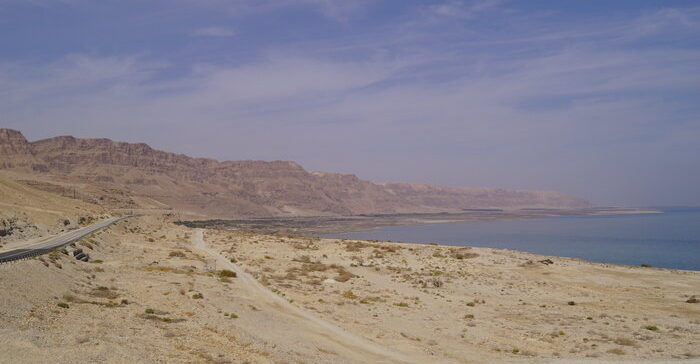PROPHETIC PARABLES
by Roger Wyatt | 14th January 2021 | more posts on
'Getting to grips with the prophets'| 2

Photograph: Roger Wyatt - looking towards the Judean Hills from the Dead Sea
The book of Jeremiah is well known for its ‘prophetic parables’. These are short, acted parables that communicate God’s message in a dynamic and even shocking way. The parables punctuate Jeremiah’s prophetic ministry, and they deliver a surprising amount of prophetic depth to the message of the prophet. Those of chapter 13 serve as good examples of this important prophetic device.
There is textual evidence to suggest that Jeremiah 13 represents a new moment in the prophetic ministry of Jeremiah, separated by over a decade from the prophecies of Jeremiah 1-12. The largest clue to support such a view comes in verse eighteen:
‘Say to the king and to the queen mother,
“Come down from your thrones,
for your glorious crowns
will fall from your heads.”’
Whilst the prophecies of early Jeremiah can be dated to the reign of Josiah (see Jeremiah 1:2), it seems unlikely that the prophecy against the king and his mother quoted above would be directed at a king who had worked tirelessly to bring religious reform to the kingdom of Judah. Moreover, if there is some sense of chronological progression in the prophecies of Jeremiah it seems possible that the prophecy is directed against Jehoahaz and his mother Hamutal. Although Jehoahaz (Shallum), was the youngest of Josiah’s sons, for unknown reasons he is placed on the throne at his father’s death. It is an act that enrages the king of Egypt, Necho II, who was responsible for the death of Josiah, and who had by the time of Jehoahaz’ accession brought the small kingdom of Judah into vassalship. Consequently, Necho deposed Jehoahaz, who had only sat on the throne for three months, exiled him to Egypt and put Josiah’s second son, Jehoiakim on the throne. Jehoiakim was born of a different mother to Jehoahaz and, if my interpretation holds up, this means that the prophecies of Jeremiah 13 can be dated to 609.
Jeremiah is instructed in chapter 13 to go and buy a ‘linen belt’ אֵזוֹר פִּשְׁתִּים (ezowr pištim – maybe a linen sash) and put it around his waist. Whilst commonly interpreted as a priestly garment, in the verses that follow, the indication is that it was in fact a symbol of prestige and honour worn by dignitaries. The puzzling addition of God’s command to Jeremiah, ‘do not let it touch water’, may be a veiled allusion to the drought Judah suffered during this period, a drought that would contribute to her ruination. Indeed, the short, acted parable implies that the sash would not be ruined by water, but by the blistering heat that would blow in from the eastern deserts.
Jeremiah is asked to take the belt to Perath פְּרָתָה (ordinarily translated as ‘the Euphrates’) and ‘hide it there in a crevice in the rocks’ (Jeremiah 13:4). It seems more likely however, that it is a reference to the town listed in Joshua, Parah (פָרָה), one of the settlements belonging to the tribe of Benjamin ‘Avvim, Parah, Ophrah’ (Joshua 18:23); it may in fact be a play on words, and a deliberate allusion to the land of the coming Babylonians. Parah was not far from Jeremiah’s hometown, and the prophet may have been staying in Anathoth for a number of years prior to the commencement of his next prophetic assignment found in chapter 13; Jeremiah 12:6 strongly implies that the prophet was both with and ill-treated by members of his family:
‘Your relatives, members of your own family—
even they have betrayed you;
they have raised a loud cry against you.
Do not trust them,
though they speak well of you.’
When Jeremiah is asked by God to go back to Perath, ‘many days later’ (Jeremiah 13:6), the sash is ruined. It seems likely that, on his return, Jeremiah went to Jerusalem where he wore the sash as a prophetic sign of God’s message that he ‘will ruin the pride of Judah and the great pride of Jerusalem’ (Jeremiah 13:8). The LORD’s word to Jeremiah continues, ‘as a belt is bound around the waist, so I bound all the people of Israel and all the people of Judah to me,’ declares the LORD, ‘to be my people for my renown and praise and honor. But they have not listened’ (Jeremiah 13:11).
The ruination of Judah is further pictured by Jeremiah’s second parable, that he may similarly have acted out: ‘“Say to them: ‘This is what the LORD, the God of Israel, says: Every wineskin should be filled with wine.’ And if they say to you, ‘Don’t we know that every wineskin should be filled with wine?’”’ (Jeremiah 13:12). What is translated as ‘wineskin’, נֵבֶל (neḇel), is more likely a reference to a bottle or a jar – in verse fourteen Jeremiah writes, וְנִפַּצְתִּים (wenippaṣtim lit. and I will shatter them – from נָפַץ nap̄əṣ to shatter). The coming of a ‘shatterer’ is a common trope in the prophetic writings, and is used to speak of a coming, merciless invader; everything that follows in the short prophetic moment confirms this – drunkenness is an ubiquitous motif for the reeling of the those facing destruction and who are forced to drink the wine of God’s wrath. Indeed, the coming judgement is to fall indiscriminately on ‘the kings who sit on David’s throne, the priests, the prophets and all those living in Jerusalem’ (Jeremiah 13:13).
A correct interpretation of these two parables relies heavily on an understanding of the context in which Jeremiah carried out his ministry. Moreover, whilst the political context is important, it is also necessary to understand the pressures facing the Near East during this period which were the direct result of a crippling drought, that lasted decades. It is also necessary to question some of the ways in which certain Hebrew words have been translated: It seems likely that by the time of Jeremiah, the settlement named Parah in the time of Joshua, was now known as Perath; a linguistic change not that difficult to explain away. Similarly, it seems obvious that wineskins do not shatter, and that Jeremiah was referencing a pot or a bottle when he delivers his second prophecy. And so, taken together, the two parables represent two important threads, that could be easily missed, in the next period of Jeremiah’s prophetic message. Both concern the ruination of Judah and Jerusalem, and the parables offer up the two main causes of the coming destruction; drought and the oncoming forces of the Babylonians.
